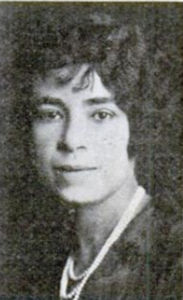
Eulalie Spence
*Eulalie Spence was born on this date in 1894. She was a Black writer, teacher, stage director, actress, and playwright.
Eulalie Spence was born on the island of Nevis in the British West Indies to Robert and Eno Lake Spence, the oldest of seven girls. She spent her formative years on her father's sugar plantation. A hurricane destroyed the plantation, and she moved to New York City with her family in 1902, living in Harlem before eventually settling in Brooklyn. Her niece Patricia Hart described Spence as "prim, proper and ultra-correct in speech and dress, yes, but she was gentle, generous, loving and the backbone of a family of seven girls."
Because her father had difficulty finding steady employment, Spence and her family lived in meager circumstances, crowded in a small apartment. Spence overcame her impoverished childhood and obtained an exceptional education. She graduated from Wadleigh High School and the New York Training School for Teachers. In 1924, she was a student at the National Ethiopian Art Theatre School, dedicated to training and employing Black actors.
Spence received a B.A. in 1937 from New York University and an M.A. in speech in 1939 from Teachers College, Columbia University, where she studied under Hatcher Hughes. Spence began teaching in the New York public school system in 1918, including over thirty years (1927-1958) at the Eastern District High School in Brooklyn, where she taught elocution, English, and dramatics.
One of her students was Joseph Papp, a playwright and producer who founded The Public Theater in 1954. W. E. B. Du Bois surmised that Blacks must build Black Drama from scratch for a Black theater. In 1926, he founded Krigwa Players (Crisis Guild of Writers and Artists), originally known as Krigwa. Krigwa sponsored a yearly literary contest that included a playwrighting competition and fostered a theater company, the Krigwa Players, which rehearsed and performed at the 135th St. branch of the New York Public Library. The contest, originally titled "The Amy Spingarn Prizes in Literature and Art," was held in 1925 and 1926 and was funded by Amy Spingarn, wife of Joel Elias Spingarn. Mrs. Spingarn contributed over $1200.00 to the prize winners.
Spence finished second in the 1926 Krigwa playwright contest for her one-act play Foreign Mail. She also won a second-place prize for Her, which was entered into a competition held by Opportunity, a magazine published by Charles S. Johnson. In 1927, Fool’s Errand, with sets designed by artist Aaron Douglas, competed in the Fifth Annual International Little Theatre Tournament, a first for Blacks since the finalists competed in a Broadway theatre. The Krigwa Players won one of four $200.00 prizes, and Samuel French published the play. Undertow tied for third place in the 1927 Crisis contest. Spence's play The Hunch won second place in the 1927 Opportunity contest; The Starter won third. It was included in Plays of Negro Life, an early collection of African American theater written by Alain Locke and Montgomery Gregory.
Spence's play, Her, opened the Krigwa Players' second season, and her sisters, Olga and Doralene Spence, acted in the Krigwa Players' productions, both receiving praise for their acting performances. Doralene Spence replaced Rose McClendon as the lead role in In Abraham's Bosom at the Cherry Lane Theatre in 1927. Critic William E. Clarke wrote in the New York Age, “Her…was by far the best of the bill. It was a ghost story written with such skill that it rose to the heights of a three-act tragedy that Eugene O’Neill might have written." Another play by Spence, On Being Forty, went unpublished but was presented publicly on at least two occasions, on October 15, 1924, by the National Ethiopian Art Theatre and a presentation in Newark, New Jersey, by the Bank Street Players, the first Little Negro Theater in New Jersey, on May 6, 1927.
Spence also directed two plays, Before Breakfast by Eugene O'Neill and Joint Owners in Spain by Alice Brown, for the Dunbar Garden Players, a short-lived theater group named in honor of Paul Laurence Dunbar. Eulalie Spence was considered one of the Harlem Renaissance's rising young playwrights, although she had little financial success. Du Bois' refusal to give Spence a share of the award money won by her play at the National Little Theatre Tournament eventually led to the end of the Krigwa Players. The $5000.00 payment she received for her screenplay of The Whipping was the only compensation she ever received as a writer.
Spence, who never married, retreated from public life after The Whipping and focused on her work as a high school teacher. At the same time, she continued to write and act for Columbia University's Laboratory Players. Eulalie Spence died in Gettysburg, Pennsylvania, on March 7, 1981, at 86. She had been living at the home of her niece, Patricia Hart, and died at the Warner Hospital. Hart occasionally corresponded with writers inquiring about her aunt, providing photos and additional biographical information. Spence's obituary did not mention her career as a playwright, saying only that she was a retired schoolteacher.